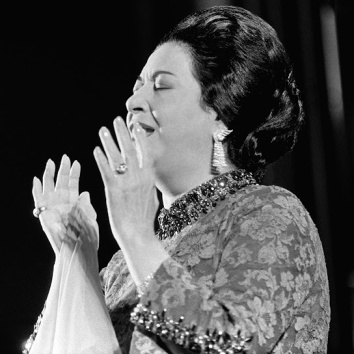Born c. 1904 (some sources say 1898) in Al Mansura, Egypt; died on February 3, 1975, in Cairo, Egypt; also known as Ibrahim Um Kalthum.
Labeled "indisputably the Arab world's greatest singer" by World Music: The Rough Guide, Egyptian singer Umm Kalthum (alternately spelled Kulthum or Kalthoum) is regarded as a treasure of Middle Eastern culture. In a career that lasted more than 50 years she became known as "the voice and face of Egypt" with a voice powerful enough to shatter glass but that was used more often to capture the emotional depth of the poems she set to music. Her importance to Egyptian music in particular and Middle Eastern music in general prompted her biographer, Virginia Danielson, to write on the All Music Guide website: "Imagine a singer with the virtuosity of Joan Sutherland or Ella Fitzgerald, the public persona of Eleanor Roosevelt and the audience of Elvis and you have Umm Kulthum, the most accomplished singer of her century in the Arab world." Kalthum's voice was expressive--some critics say melodramatic--and her performances would alternately hold her audiences in thrall and bring them to emotional paroxysms. Her voice was equally powerful over a wide range and could shift resonance in an extremely nuanced fashion. She was once challenged, apocryphally, to sing the same line 52 different ways. Not only was she able to do so, she was also able to advance a melody upon each rendering. Such virtuosity allowed Kalthum to adapt longer poems to the musical idiom for performances of a single composition that sometimes lasted longer than one hour.

